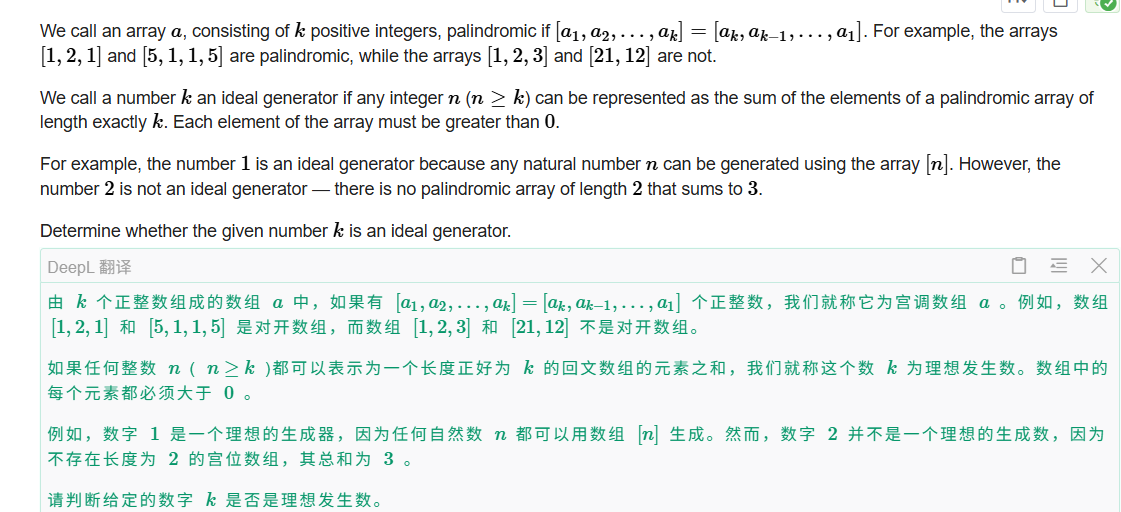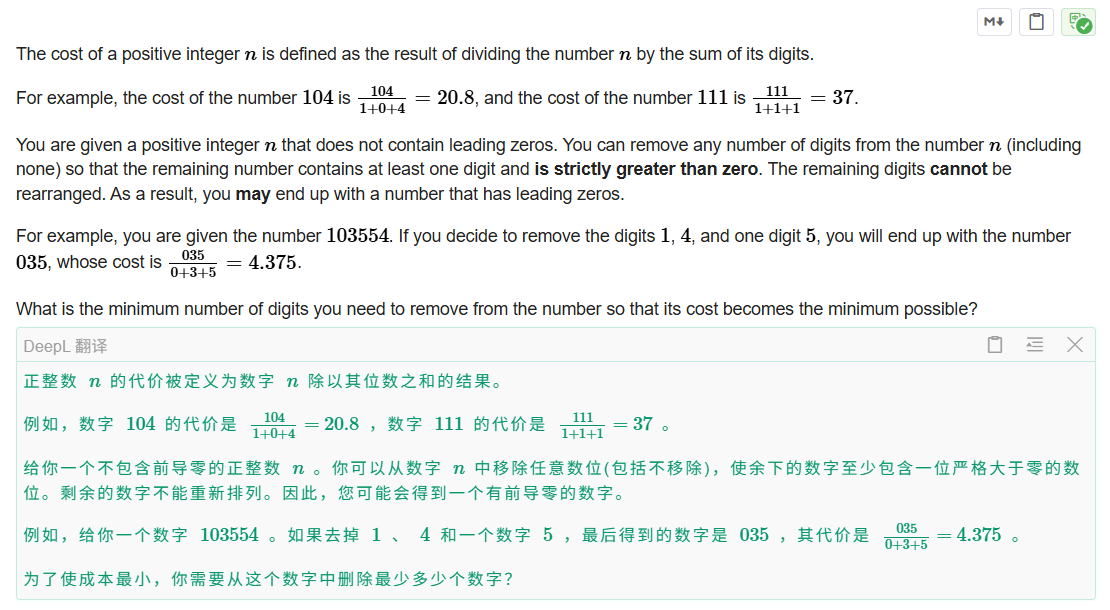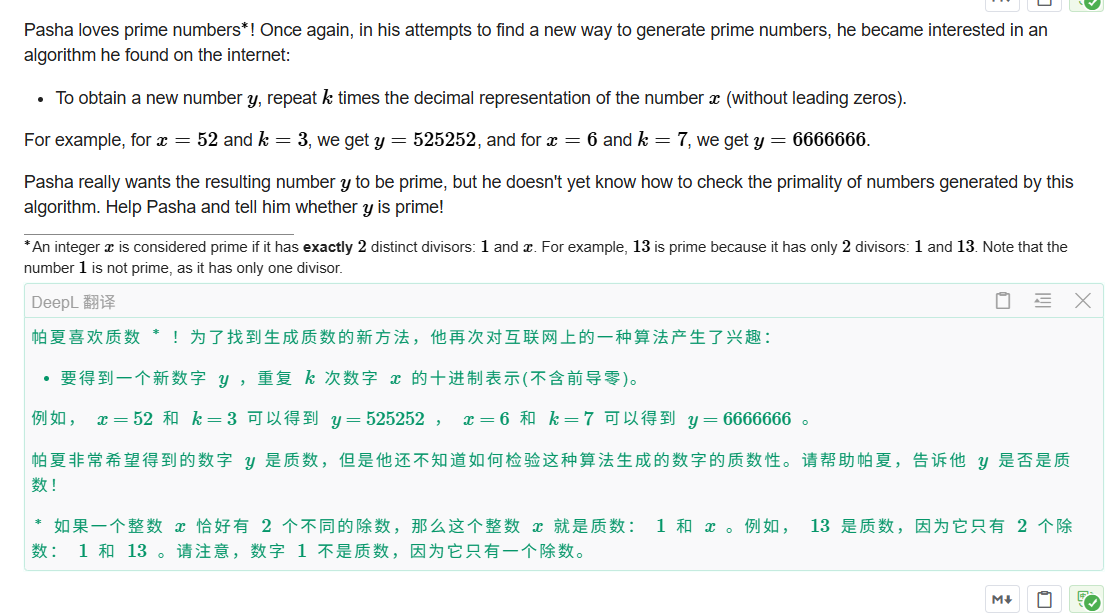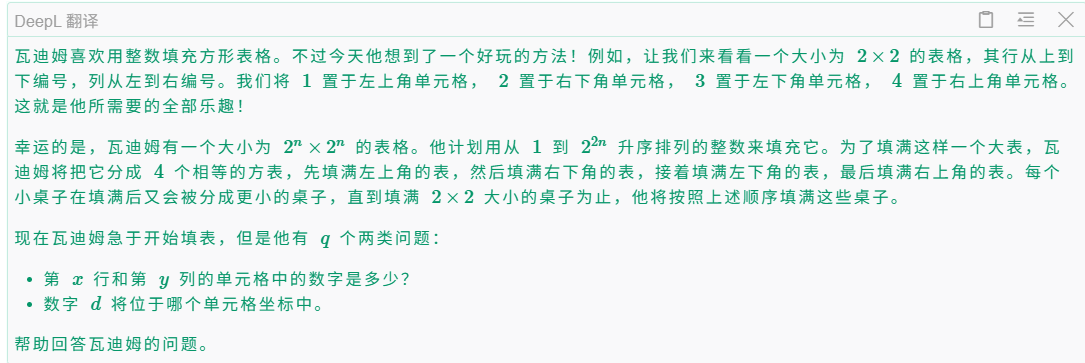Codeforces Round 1016 (Div. 3)
A. Ideal Generator
https://codeforces.com/contest/2093/problem/A
题意

思路
只有奇数长度的 k 能满足条件
- k=1: [1], [2], …, [n]
- k=2: [1, 1], x, [2, 2]
- k=3: [1, 1, 1], [1, 2, 1], [2, 1, 2]
- ……
AC代码
点击查看代码
#define _USE_MATH_DEFINES // To use the definition of cmath
#include <bits/stdc++.h>
using namespace std;
using ll = long long;
using ld = long double;
using ull = unsigned long long;
// mp.reserve(1024), mp.max_load_factor(0.75);
// Used only for basic types, pair and tuple.
template<typename T>
struct custom_hash_base {
size_t operator()(const T& x) const {
static const size_t seed = chrono::steady_clock::now().time_since_epoch().count();
return _Hash_bytes(&x, sizeof(x), seed);
}
};
static const auto _ = []() {
ios::sync_with_stdio(false);
cin.tie(nullptr);
cout.tie(nullptr);
#ifndef ONLINE_JUDGE
freopen("../in.txt", "r", stdin);
#endif
return nullptr;
}();
inline void solve() {
int k;
cin >> k;
if (k & 1) {
cout << "Yes\n";
} else {
cout << "No\n";
}
}
int main() {
int T;
for (cin >> T; T > 0; --T) {
solve();
}
return 0;
}
B. Expensive Number
https://codeforces.com/contest/2093/problem/B
题意

思路
只保留从右往左,第一个非零的数位和它前面的 0,其它的数位都移除
AC代码
点击查看代码
#define _USE_MATH_DEFINES // To use the definition of cmath
#include <bits/stdc++.h>
using namespace std;
using ll = long long;
using ld = long double;
using ull = unsigned long long;
// mp.reserve(1024), mp.max_load_factor(0.75);
// Used only for basic types, pair and tuple.
template<typename T>
struct custom_hash_base {
size_t operator()(const T& x) const {
static const size_t seed = chrono::steady_clock::now().time_since_epoch().count();
return _Hash_bytes(&x, sizeof(x), seed);
}
};
static const auto _ = []() {
ios::sync_with_stdio(false);
cin.tie(nullptr);
cout.tie(nullptr);
#ifndef ONLINE_JUDGE
freopen("../in.txt", "r", stdin);
#endif
return nullptr;
}();
int cnt[110];
inline void solve() {
memset(cnt, 0, sizeof(cnt));
string num;
cin >> num;
const int len = num.size();
for (int i = 1; i < len; ++i) {
if (num[i] == '0')
cnt[i] += cnt[i - 1] + 1;
else
cnt[i] = cnt[i - 1];
}
int idx = len - 1;
for (; idx >= 0; --idx) {
if (num[idx] != '0') break;
}
cout << len - 1 - cnt[idx] << '\n';
}
int main() {
int T;
for (cin >> T; T > 0; --T) {
solve();
}
return 0;
}
C. Simple Repetition
https://codeforces.com/contest/2093/problem/C
题意

思路
当 k 大于 1,除了 x = 1 时,都是 NO
x = 1,需要特判。这里直接将 y 构造出来,然后 k 变成 1
k 为 1 时,直接判断是否为质数
AC代码
点击查看代码
#define _USE_MATH_DEFINES // To use the definition of cmath
#include <bits/stdc++.h>
using namespace std;
using ll = long long;
using ld = long double;
using ull = unsigned long long;
// mp.reserve(1024), mp.max_load_factor(0.75);
// Used only for basic types, pair and tuple.
template<typename T>
struct custom_hash_base {
size_t operator()(const T& x) const {
static const size_t seed = chrono::steady_clock::now().time_since_epoch().count();
return _Hash_bytes(&x, sizeof(x), seed);
}
};
static const auto _ = []() {
ios::sync_with_stdio(false);
cin.tie(nullptr);
cout.tie(nullptr);
#ifndef ONLINE_JUDGE
freopen("../in.txt", "r", stdin);
#endif
return nullptr;
}();
ll x, k;
bool isPrime(const ll n) {
if (n == 1)
return false;
if (n == 2 || n == 3)
return true;
if (n % 2 == 0 || n % 3 == 0)
return false;
for (ll i = 5; i <= n / i; i += 6) {
if (n % i == 0 || n % (i + 2) == 0) return false;
}
return true;
}
inline void solve() {
cin >> x >> k;
if (x == 1) {
ll a = 0;
while (k--) {
a *= 10;
a += x;
}
x = a, k = 1;
}
if (k > 1) {
cout << "NO\n";
return;
}
cout << (isPrime(x) ? "YES\n" : "NO\n");
}
int main() {
int T;
for (cin >> T; T > 0; --T) {
solve();
}
return 0;
}
D. Skibidi Table
https://codeforces.com/contest/2093/problem/D
题意
Vadim loves filling square tables with integers. But today he came up with a way to do it for fun! Let’s take, for example, a table of size
Fortunately for Vadim, he has a table of size
Now Vadim is eager to start filling the table, but he has
- what number will be in the cell at the
-th row and -th column; - in which cell coordinates will the number
be located.
Help answer Vadim’s questions.

思路
递归,不断缩小边界
AC代码
点击查看代码
#define _USE_MATH_DEFINES // To use the definition of cmath
#include <bits/stdc++.h>
using namespace std;
using ll = long long;
using ld = long double;
using ull = unsigned long long;
// mp.reserve(1024), mp.max_load_factor(0.75);
// Used only for basic types, pair and tuple.
template<typename T>
struct custom_hash_base {
size_t operator()(const T& x) const {
static const size_t seed = chrono::steady_clock::now().time_since_epoch().count();
return _Hash_bytes(&x, sizeof(x), seed);
}
};
static const auto _ = []() {
ios::sync_with_stdio(false);
cin.tie(nullptr);
cout.tie(nullptr);
#ifndef ONLINE_JUDGE
freopen("../in.txt", "r", stdin);
#endif
return nullptr;
}();
int n, q;
ll d, x, y;
int mpx[5] = {0, 1, 2, 2, 1};
int mpy[5] = {0, 1, 2, 1, 2};
int blocks[2][2] = {
{1, 4},
{3, 2}
};
void find_num(const ll m, ll i = 1, ll j = 1LL << n, const ll mi = 1LL, const ll mx = 1LL << (n << 1)) {
if (mi == mx) {
x = i;
y = j;
return;
}
const ll del = (mx - mi + 1) / 4;
const ll pos = m % del;
const ll block = m / del + (pos != 0);
const ll del2 = sqrt(del);
i += mpx[block] == 2 ? del2 : 0;
j -= mpy[block] == 1 ? del2 : 0;
find_num(pos, i, j, mi + (block - 1) * del, mx - (4 - block) * del);
}
ll get_num(ll i, ll j, const ll mi = 1LL, const ll mx = 1LL << (n << 1)) {
if (mi == mx)
return mi;
const ll del = (mx - mi + 1) / 4;
const ll del2 = sqrt(del);
const ll block = blocks[i > del2][j > del2];
i = i > del2 ? i - del2 : i;
j = j > del2 ? j - del2 : j;
return get_num(i, j, mi + (block - 1) * del, mx - (4 - block) * del);
}
inline void solve() {
// 1 4 13 16
// 3 2 15 14
// 9 12 5 8
// 11 10 7 6
cin >> n >> q;
string spt;
while (q--) {
cin >> spt;
if (spt[0] == '-') {
// q1
cin >> x >> y;
cout << get_num(x, y) << '\n';
} else {
// q2
cin >> d;
find_num(d);
cout << x << ' ' << y << '\n';
}
}
}
int main() {
int T;
for (cin >> T; T > 0; --T) {
solve();
}
return 0;
}











